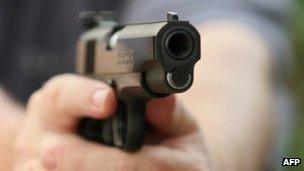Talks on global arms treaty set to begin in New York
- Published

A coalition of campaigners has pressed for a treaty on global arms sales for six years
A month of UN-hosted talks are due to kick off in New York, aiming to establish a treaty controlling arms sales around the world.
Over the coming weeks, negotiators will seek to determine the scope of the treaty and to reach a consensus.
Campaigners say conflicts like the one in Syria have made the advent of such a treaty even more urgent.
But some of the biggest exporters have reservations, says BBC diplomatic correspondent Jonathan Marcus.
The global arms trade is estimated to be worth $60-$70bn (£40-50bn) per year, and 750,000 people are killed by illicit weapons each year.
Illegal or poorly regulated arms sales contribute to a syndrome - fuelling conflict, boosting corruption and generally undermining development throughout the poorer parts of the world, our correspondent says.
The opening of these negotiations on a treaty to establish common standards for the global trade comes after a six-year campaign by a coalition of non-governmental organisations, including Amnesty International and Oxfam.
'Immeasurable suffering'
"From Congo to Libya, from Syria to Mali, all have suffered from the unregulated trade in weapons and ammunition allowing those conflicts to cause immeasurable suffering and go on far too long. In the next few weeks, diplomats will either change the world - or fail the world," said Oxfam's Anna Macdonald.
"It is an absurd and deadly reality that there are currently global rules governing the trade of fruit and dinosaur bones, but not ones for the trade of guns and tanks," said Jeff Abramson, director of Control Arms.
The treaty is supported by an overwhelming majority of UN members, but some of the world's leading exporters have expressed reservations.
The initially sceptical US - the world's biggest arms exporter - now backs a treaty, but along with China, Syria and Egypt does not want to see ammunition included.
China wants to exempt small arms, and several Middle Eastern states oppose making compliance with human rights standards mandatory for those wishing to purchase arms.
Any draft treaty that emerges from these talks, which finish on 27 July, must be approved unanimously - effectively giving all countries the power of veto.
But campaigners point out that even if a treaty is vetoed, it can be taken to the 193-member UN General Assembly and adopted with a two-thirds majority.
- Published31 May 2012
- Published24 May 2012
- Published13 February 2012
- Published7 June 2011
- Published11 May 2012
- Published19 March 2012
- Published22 February 2011
- Published29 October 2011